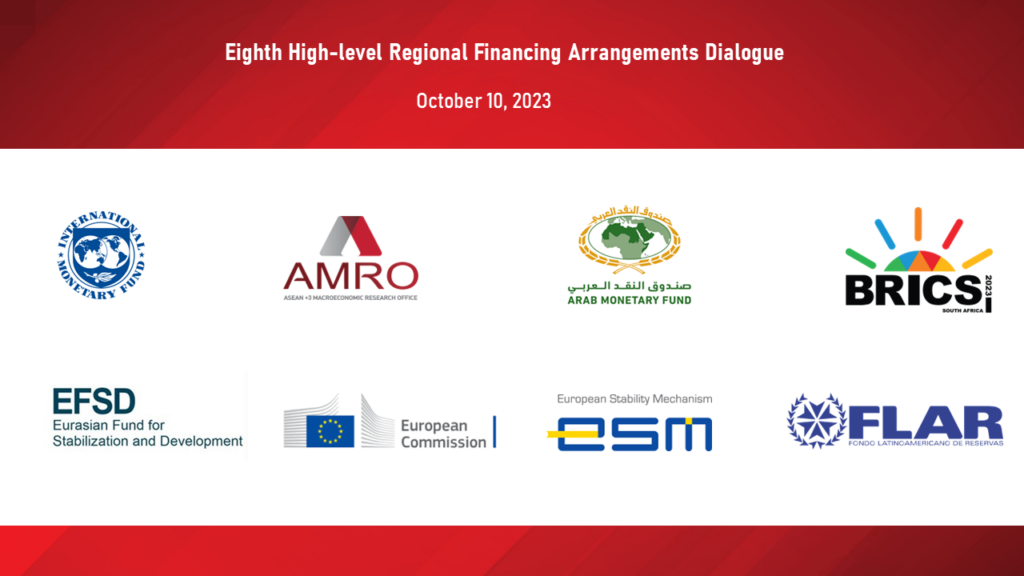
SINGAPORE, October 10, 2023 – The eighth High-level Regional Financing Arrangements (RFAs) Dialogue was held on October, 10, 2023, in Marrakesh. Amidst a precarious global economic recovery, the discussion focused on how crisis fighters can contribute to macroeconomic and financial stability in a more shock-prone world and the role of IMF-RFA collaboration therein. Following the devastating earthquake in Morocco on September 8, participants expressed their solidarity with the Moroccan authorities and people extending their deepest sympathies to all those affected.
The staff of the International Monetary Fund (IMF) and the heads of RFAs (the Arab Monetary Fund, the ASEAN+3 Macroeconomic Research Office cum the Chiang Mai Initiative Multilateralisation, represented by Bank Indonesia as its 2023 Co-chair, the BRICS Contingent Reserve Arrangement, represented by the South African Reserve Bank, the Eurasian Fund for Stabilization and Development, the European Commission, the European Stability Mechanism, and the Latin American Reserve Fund) discussed economic developments at global and regional levels and updated each other on institutions’ activities since October 2022. They noted that the global economy has shown resilience to the string of recent shocks and crises, but the recovery is slow, uneven, and fragile. Against this backdrop, they stressed the need to stay the course with policies that ensure a return to price stability and promote growth and financial stability.
The RFAs considered their roles in an increasingly uncertain world where countries are confronted with new challenges due to factors such as more frequent and extreme climate disasters, the accelerated transition to a digital economy, and demographic changes. The heads underlined the importance of readying their institutions for this changing economic and financial landscape. They exchanged views on possible ways to boost their institutions’ capabilities against shocks, ranging from adjusting lending toolkits to ensure their relevance in the prevention and resolution of future crises, upgrading economic monitoring capabilities to better account for new vulnerabilities and risks, and expanding the scope of capacity development initiatives to include emerging policy issues. The RFAs agreed to continue sharing insights with each other and the IMF staff, as they strengthen tools, policies, and frameworks to ensure their continued effectiveness in assisting members within the remit of their respective mandates.
IMF staff presented its assessment of the global economic outlook and the policy priorities for preserving macroeconomic stability and bolstering sustainable and inclusive growth. The IMF supports its members in implementing this policy agenda through its surveillance, financial support, and capacity development, while serving as a platform for cooperation aimed at finding joint solutions. IMF staff also updated the RFAs on the recently completed reviews of its precautionary and signaling instruments, as part of its efforts to adapt its toolkit to the evolving needs of the membership and ensure that the Global Financial Safety Net is resilient. The Review of the Flexible Credit Line (FCL), Short-term Liquidity Line (SLL) and the Precautionary and Liquidity Line (PLL) is based on the premise that crisis prevention is far less costly that crisis resolution and that the value of precautionary instruments rises in a shock-prone environment. To that end, the review focused on ensuring strong signaling through a clear qualification framework and on enhancing the agility and capacity of the precautionary instruments to help countries face different types of external risks. The Review of the Policy Coordination Instrument (PCI) introduced refinements to ensure its strong signaling function and help catalyze external financing from official and private creditors. While acknowledging differences in legal frameworks across RFAs in regard to signaling instruments such as the PCI, the IMF staff stressed the need to continue close engagement with RFAs in line with the 2017 collaboration framework, which remains well-suited to this end.
Multilateral collaboration is more vital than ever in this era of rising geoeconomic fragmentation. In this spirit, the heads of RFAs welcomed the publication earlier this year of the study prepared by their staff on the role of RFAs in the global efforts to mitigate global warming and deal with the consequences of climate change. They also thanked the French Co-chair of the G20 International Financial Architecture Working Group for updating them on the group’s latest work and priorities, especially in the pursuit of a stronger Global Financial Safety Net.
The eighth joint RFA Research Seminar will be held in Luxembourg in the first half of 2024. The ninth High-level RFA Dialogue will be convened at the time of the next IMF/ World Bank Annual Meetings in October 2024.
